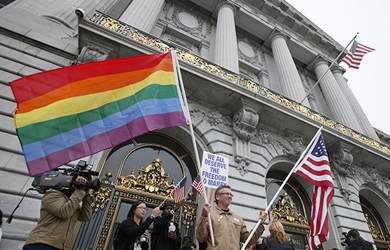The Senate battle over the confirmation of judicial nominees reflected the epitome of Republican obstructionism, with nominees who won significant if not unanimous support from the Judiciary Committee failing to receive up-or-down votes on their confirmation. Of the 38 pending judicial nominees the Senate was only able to confirm 19 of them before adjourning for the year, exacerbating the country’s judicial vacancy crisis that is growing so badly that even GOP-appointed judges have called on Senate Republicans to end the blockade.
Mario Diaz, the Policy Director for Legal Issues at Concerned Women for America, believes though that Republicans should oppose Obama’s judicial nominees just like starving children should avoid eating “poisoned apples.” He resurrects the same tired arguments used to oppose the confirmation of Supreme Court Justice Elena Kagan when he takes direct aim at Goodwin Liu, suggesting that he should not be appointed to the Ninth Circuit Court because he views the Constitution as a living document and “has no judicial experience and almost no legal experience.” Diaz writes:
The liberal cry for more judges has reached an all-time high. Their media cohorts have been banging the drums with the numbers game and the judicial emergency cry in perfect sync. They have become masters of smokescreens and shadows while ignoring the essence.
The nomination of judges is about substance.
If children are starving and you give them poisoned apples, have you really helped them? Hardly! Oh sure, you can say they have more than they had before, but they can’t eat it. It would kill them.
In the same way, assuming you can successfully argue that the country is “starving” for judges (others might argue that what we need are fewer lawsuits, not more judges), President Obama seems to think that by nominating extreme liberal political operatives like Goodwin Liu he is somehow meeting that need. But like the poisoned apples, such nominees would pervert justice, not promote it. And we must be willing to go to great lengths to oppose them.
Aside from the fact that Liu has no judicial experience and almost no legal experience, his view of the role of a judge and the Constitution cannot be more warped. He has made clear he sees the Constitution as a living, breathing document that changes with the times and that judges get to decide what those changes are.
In a 2008 Stanford Law Review article, he argued that judges should use “socially situated modes of reasoning that appeal … to the culturally and historically contingent meanings of particular social goods in our own society” and that they should “determine, at the moment of decision, whether our collective values on a given issue have converged to a degree that they can be persuasively crystallized and credibly absorbed into legal doctrine.” He was apparently arguing for a new constitutional right to welfare.
Liu is such a political operative that he actually testified before the Senate Judiciary Committee against the confirmation of Supreme Court Justice Samuel Alito, attacking him viciously. He was also an outspoken opponent of Chief Justice Roberts’ nomination. They were, of course, too far to the right for him. Can you imagine, they actually said they will take the Constitution only for what it says?
…
And he is not alone. President Obama has been consistent in nominating radicals (see David Hamilton, Louis Butler, Edward Chen, and Robert Chatigny).
So the liberal elite and their media can keep playing their sad tune about judges. It doesn’t really matter how hungry you are if a person keeps giving you poisoned apples. In fact, can you even trust when they offer one that looks okay?
According to Diaz, Justices Roberts and Alito are model justices who “take the Constitution only for what it says.” Of course, Roberts and Alito have been exposed for their pro-corporate agenda, as Jeffrey Toobin of The New Yorker writes, “the rule in the current Supreme Court” is that if “there is a human being on one side of the ‘v.’ and a corporation on the other, the corporation wins.” A New York Times analysis found that the Roberts Court is far more sympathetic to corporations than even the conservative Rehnquist Court. As Arlen Specter recently claimed, “Chief Roberts promised to just ‘call balls and strikes,’ and then he moved the bases.”
Diaz’s misguided praise for Roberts and Alito is only matched in its absurdity to his opposing Liu, the Associate Dean of the Berkeley School of Law, on the grounds that he “has no judicial experience.” If Diaz believes that Republicans should block Liu’s confirmation to the Ninth Circuit because Liu is not a judge, then by the same logic he should have opposed confirming Roberts to the DC Circuit since he never served as a judge prior to his nomination.
He also badly misconstrues Goodwin Liu’s legal experience. Liu served as a clerk for Supreme Court Justice Ruth Bader Ginsberg and a DC Circuit court judge, in addition to working as an appellate litigator. As Associate Dean of the Berkeley School of Law, Liu has received wide praise from both progressive and conservative legal scholars, and conservatives John Yoo and Ken Starr said “Goodwin is an outstanding nominee.” While Diaz believes that Liu’s criticism of Roberts and Alito disqualifies him from serving, The New York Times notes that “Liu’s warnings that the two men would be extremely conservative justices have turned out to be completely on target,” while Liu’s “views fall within the mainstream of legal scholarship and American politics.”
Diaz goes on to distort Liu’s legal writings, maintaining that he argued “for a new constitutional right to welfare.” The Alliance for Justice makes clear that Liu has ardently opposed an expansive role for the judicial branch:
[Liu] has argued for a model of judicial restraint, concluding that courts should not interpret the Constitution to create affirmative welfare rights, whether to education, health care, or minimal levels of subsistence. Liu has explained that “such rights cannot be reasoned into existence by courts on their own” and has explained that his understanding of the judicial role “does not license courts to declare rights to entirely new benefits or programs not yet in existence.”
Only a right wing hypocrite like Diaz could falsely represent Justices Roberts and Alito as archetypes of judicial restraint and claim that Obama’s urgently-needed judicial nominees as “radicals.” Diaz is forced to levy ridiculous and bogus arguments against Liu in order to backup his wildly inaccurate case opposing Obama’s nominees, however, Senate Republicans have largely followed his lead in their willingness “to go to great lengths to oppose them.”








